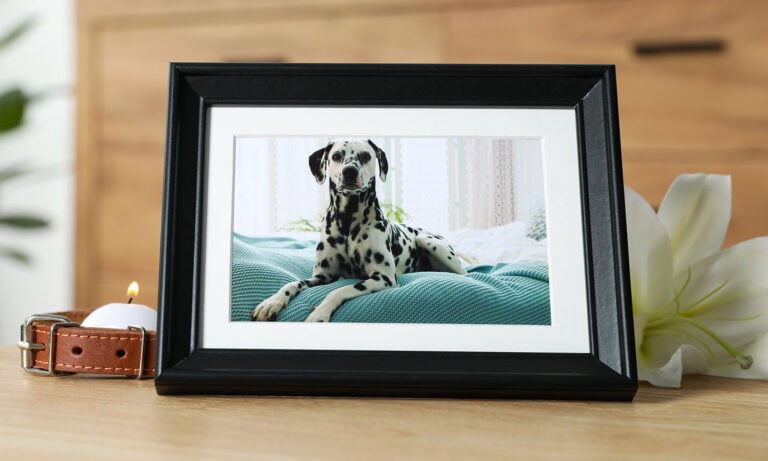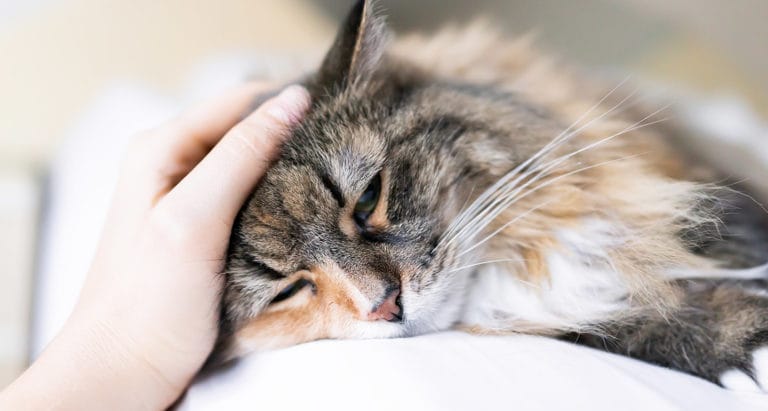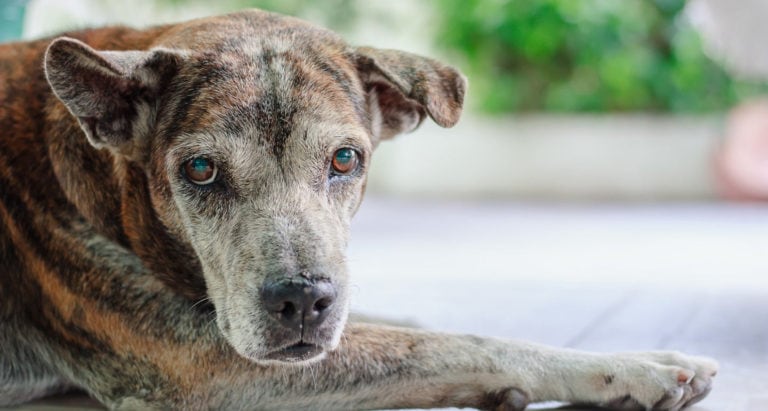Losing a pet is one of the hardest things you may ever have to go through.
Whether you’re struggling after a pet loss or getting ready to help your pet cross the rainbow bridge, there are some things you can do to make the process feel a little more manageable.
We talked to two experts—Dani McVety, DVM, founder of Lap of Love Veterinary Hospice and expert on end-of-life pet care; and Anne Marie Farage-Smith, LMHC, a licensed mental health counselor, author, and animal grief expert—to get some advice on how to cope with the loss of a pet.
But remember, mourning and grief are very personal—take your time.
Why Does Losing a Pet Hurt So Much?
Just like losing a human family member, losing a pet can be a traumatic experience. Pets quickly become a part of your family, and you build a bond on mutual love and trust.
Pets love you unconditionally and are by your side during good and bad times. They share your life with you in intimate ways that even your friends and family members may not, perhaps comforting you when you’re sad or sharing your bed.
“Their constant presence truly becomes a steady source of support that you can count on,” says Farage-Smith.
Pets also become a big part of your daily routine. You may feed them as soon as you wake up, take them for an after-dinner walk, and play with them in the park on weekends. The change in routine brought on by their death can feel profound, and it’s a void that’s hard to fill.
6 Ways to Cope With the Loss of a Pet
It’s normal to feel deep sorrow, confusion, and even anger when you lose a pet. The goal isn’t to make those feelings go away or try to “get over” them.
Instead, there are some things you can do to help yourself move toward accepting the loss and embracing what will become your new routine in the weeks, months, and years to come.
1. Let Yourself Grieve
First and foremost, give yourself grace. A pet is a part of the family, and Dr. McVety says that it’s important to give yourself room to grieve for as long as you need to without judgment.
Remember that grief is not a linear process. You might feel better one day and then intense sorrow the next. This roller coaster of emotions is completely normal.
Everyone’s grieving process is different. Among other emotions, you may feel:
- Sadness
- Anger
- Shock
- Guilt
- Anxiety
- Fear
Let yourself feel all these without trying to force yourself to move past them or feel differently.
2. Don’t Dwell on the Bad Times
While uncomfortable emotions will undoubtedly arise during the grieving process, Dr. McVety says you should do your best to focus on the positive impact you had on your pet’s life and acknowledge the love, joy, and safety they found with you.
Picture your pet’s happiest moments and let those be the memories you cherish.
Dr. McVety says that it's natural to feel a sense of responsibility for what happened to your pet, and you may feel a sense of guilt when trying to rationalize loss. She says pet parents often seek explanations to make sense of what happened, which can lead to undeserved guilt, even when the situation was beyond your control.
However, blaming yourself for your pet’s illness, accident, or death can trap you in a cycle of guilt and grief, especially when you had no control over the outcome.
Remember that life’s constraints, like finances and time, can limit your options. Accept that you did your best with what you had.
3. Reach out To Loved Ones
While losing a pet can feel like an isolating experience, the people in your life who care about you likely want to help. Dr. McVety says you should not be afraid to ask for practical and emotional support from family and friends, whether that’s requesting a hot meal or some company.
The more you retreat from meaningful connections, the harder the process can be. This doesn’t mean you have to jump right back into social events, but you should lean on people when you need to.
If you have another pet, you may find some comfort in spending time with them and helping them through the grieving process as well.
4. Attend a Support Group
If you don’t have family members or friends who can assist or if you need more help, you can turn to a support group.
You can find pet loss support groups online or check for in-person support groups in your area. Your veterinary clinic may have resources for grief services in your area.
If you need more focused, one-on-one time, Farage-Smith says you may also wish to contact a counselor who specializes in pet bereavement counseling.
5. Memorialize Your Pet
When you’re ready, memorializing your pet can also be a profound part of the healing process.
Farage-Smith recommends a memorial stone, planting a tree in their memory, or donating to a local rescue group. She says that you could also have a memorial service with family and friends to honor your pet’s life.
Each person who attends can write and share one memory of your pet, and you can serve some of your pet’s favorite human treats, such as plain popcorn, cheese cubes, or blueberries.
6. Take Care of Yourself
While it may be difficult to stick to your normal routine, Farage-Smith also says it’s important to take care of yourself during this time.
Try to eat small nutritious meals even if you don’t have an appetite, keep yourself hydrated, and be sure to get enough sleep. This nourishment and self-care can help keep you moving through your grief.
After some time has passed, she also recommends adding in some relaxing and calming activities, like daily walks, light stretching, connecting with nature, and getting natural light by going outdoors. Positive affirmations and journaling can also help you focus on positive feelings.
FAQs About How To Cope With the Loss of a Pet
Q:How do I get over the grief of losing a pet?
A:You may never really “get over” the grief, but instead learn how to integrate that loss into your life. This means finding ways to continue living and moving forward while still honoring your pet’s memory. Allow yourself the space to feel these emotions without pressure to get over them.
Q:Why does losing a pet hurt so much?
A:Pets offer unconditional love and become a big part of your daily life. Losing them can feel just like losing a human family member, which is why it hurts so much. Your grief is evidence of the love you had for your pet.
Q:How long does it take to cope with the loss of a pet?
A:The timeline for grieving a pet is deeply personal and varies from person to person. Some people may start to feel better after a few days, while others may mourn for months or years. If active mourning is continuing for months to years, you may consider speaking with a grief counselor to help you move forward in life.
While the suggestions in this article can help, the grieving process is deeply personal. During this time, be kind to yourself and don’t be afraid to ask for help and support.
When you’re ready, here are some of our favorite ways to memorialize your pet.
Expert input provided by Dani McVety, DVM, founder of Lap of Love Veterinary Hospice and Anne Marie Farage-Smith, LMHC, a licensed mental health counselor, author, and animal grief expert in Rochester, New York.
Like this story? Check out more of our favorite reads:
Share:









